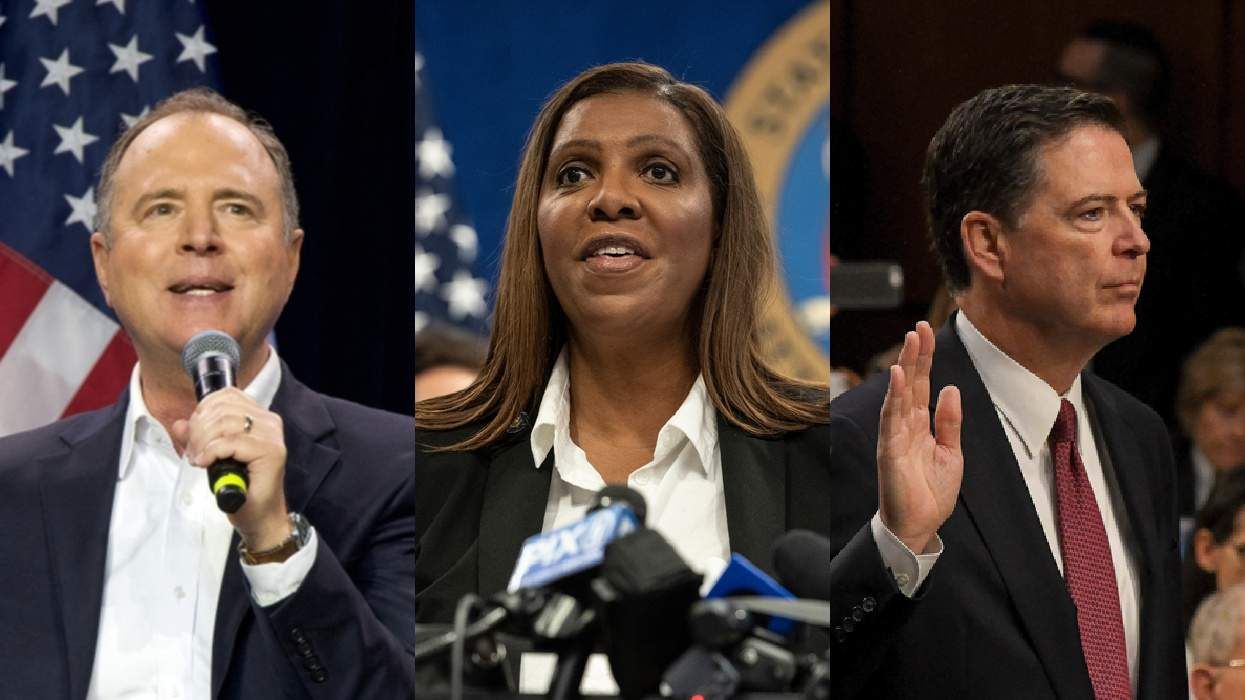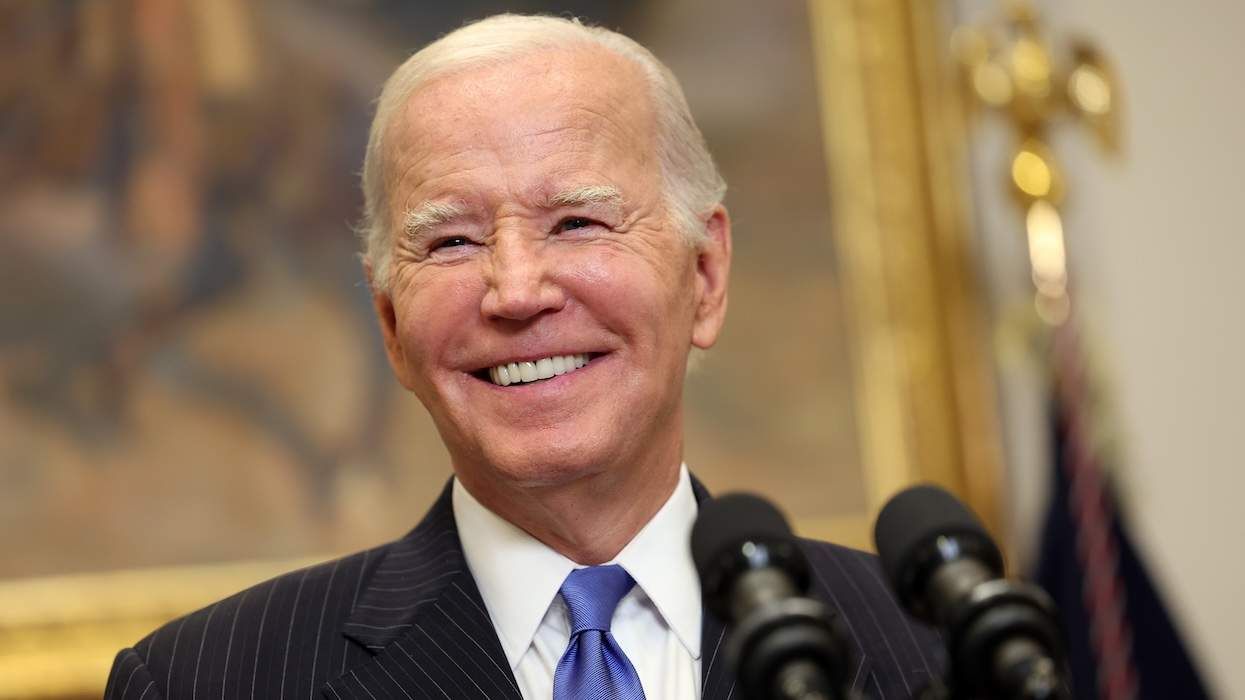CONTACTAbout UsCAREER OPPORTUNITIESADVERTISE WITH USPRIVACY POLICYPRIVACY PREFERENCESTERMS OF USELEGAL NOTICE
© 2025 Equal Entertainment LLC.
All Rights reserved
All Rights reserved
By continuing to use our site, you agree to our Privacy Policy and Terms of Use.
We need your help
Your support makes The Advocate's original LGBTQ+ reporting possible. Become a member today to help us continue this work.
Your support makes The Advocate's original LGBTQ+ reporting possible. Become a member today to help us continue this work.
This week brought a couple of unfortunate revelations about the transparency and modus operandi of the Obama administration that did not bode well for either its moral authority or any potential last-ditch effort to rescue "don't ask, don't tell" repeal from the death grip of the lame-duck.
As first noted by the Wonk Room's Igor Volsky, former senator Tom Daschle disclosed in his newly released book Getting It Done - which chronicles the bumpy road to passing health care reform - that the White House bargained away the public option last year just a few months into a process that spanned more than a year.
Writes Volsky: "After the Senate Finance Committee and the White House convinced hospitals to accept $155 billion in payment reductions over ten years on July 8, [2009], the hospitals and Democrats operated under two 'working assumptions.' 'One was that the Senate would aim for health coverage of at least 94 percent of Americans,' Daschle writes. 'The other was that it would contain no public health plan, which would have reimbursed hospitals at a lower rate than private insurers.'"
In a subsequent interview with Volsky, Daschle tried to soften the wording, adding that the public option wasn't "taken off the table completely," but "they wanted to keep those stakeholders in the room, and this was the price some thought they had to pay."
Now, people will disagree about whether this was a necessary compromise to make so early and just how satisfactory the final health care bill was, but what is indisputable is the fact that the White House continued to tell people the president and his advisers were still working toward achieving a public option.
When the press corps, sensing a shift over a month later, asked press secretary Robert Gibbs directly on August 17 if anything had changed, he flatly responded, "No."
"The goals are choice and competition," Gibbs said. "[The president's] preference is a public option. If there are other ideas, he's happy to look at them."
And that's just one reassurance of many that came from the press shop and top White House aides.
On Wednesday the federal commission investigating the spill released a preliminary report that blasted administration officials for initially fixating on a flow rate of about 5,000 barrels a day with little evidence or explanation into their methodology. Once BP started airing video of seepage in May, external experts put the estimate at closer to 70,000 barrels a day -- a number the commission considered far closer to the truth.
National Public Radio was one of the first outlets at the time to report severe discrepancies between the administration pronouncements and the actuality, and NPR's Ari Shapiro did a damning follow up on the commission's report this week.
But one paragraph from the report really says it best:
"By initially underestimating the amount of oil flow and then, at the end of the summer, appearing to underestimate the amount of oil remaining in the Gulf, the federal government created the impression that it was either not fully competent to handle the spill or not fully candid with the American people about the scope of the problem."
Not fully competent or not fully candid.
On Thursday, Gibbs disputed both characterizations, adamantly denying that the administration tried to obscure the worst-case scenario.
"We were as candid as we could be with the information we had when we had it," he said. "I fully admit that in April I did not know what I knew in August."
The new insights gleaned from these stories has reinforced a couple of working precepts moving forward.
First, this administration seems to arrive at any bargaining table ready to make a deal. That may be seen as a virtue by some or a weakness/strategic misstep by others, but it is nonetheless something administration officials consistently telegraph that can be exploited by those sitting across from them.
Second, what they are saying is not always an accurate reflection of what is happening, even on some of the most pressing issues of their administration. In other words, better for outsiders to look for clues rather than take things at face value.
Despite the fact that a White House spokesman indicated that they fully "expect" the Senate to act on the National Defense Authorization Act by year's end, neither of the aforementioned axioms bode well for "don't ask, don't tell" repeal.
The White House has always signaled that they are in lock step with the Pentagon on repeal. If you go back to the statements released from the White House (via former OMB director Peter Orszag) and the Pentagon (via Defense secretary Robert Gates) the week of the vote in the House and Senate Armed Services Committee, they are almost identical.
Both letters say that "ideally" Congress would not take action until the Pentagon report is released before Orszag concedes that the bill's language "meets the concerns" raised by top military brass and Gates says he could "accept" the compromise language.
That's why it's best to pay attention when Gates told reporters a couple weeks ago that he and the president both held the opinion that "the best legislation would be legislation informed by the review" that's due out in early December. You can bet that Gates wasn't freelancing that answer and that it's likely a truer reflection of White House intent on repeal.
Unfortunately, we have also learned from some recent reporting by the iconic Bob Woodward of The Washington Post that the relationship between the Pentagon and the White House is a classic tail-wagging-the-dog folly in many instances.
In a particularly telling passage from his book Obama's Wars, Woodward describes a scene in the Situation Room that took place with Gates, Joint Chiefs Chairman Adm. Mike Mullen, and Gen. David H. Petraeus, then head of U.S. Central Command. Obama had tasked them with giving him a range of options for proceeding in Afghanistan and they essentially showed up with only one option - one that involved escalating U.S. involvement in the region by adding 40,000 more troops.
According to subsequent interviews Woodward has given, Gates declined to give the president what he asked for, and Obama had to devise his own Afghan strategy.
Bottom line, when it comes to most negotiations between the White House and the Pentagon, what Gates wants, Gates gets. Quite frankly, it wouldn't be outrageous to think that the president is willing to let DADT linger as he works to simply get the answers he's looking for in Iraq, Afghanistan, and Pakistan.
It's not only a terrible scenario for DADT, it's a frightening scenario for our country - the idea that officials at the Pentagon would be so openly defiant of the commander in chief.
Passing "don't ask, don't tell" in the lame-duck session would take a Herculean effort that involved Secretary Gates giving his blessing, President Obama using his bully pulpit, and the Senate Democrats displaying extraordinary leadership. If past is prologue, all three of those seem a tad fantastical. But Gates is key -- he will be making the call on DADT in December. Without his buy in, it isn't happening.
From our Sponsors
Most Popular
Bizarre Epstein files reference to Trump, Putin, and oral sex with ‘Bubba’ draws scrutiny in Congress
November 14 2025 4:08 PM
True
Jeffrey Epstein’s brother says the ‘Bubba’ mentioned in Trump oral sex email is not Bill Clinton
November 16 2025 9:15 AM
True
Watch Now: Pride Today
Latest Stories
HIV-positive men stage 'Kiss-In' protest at U.S.-Mexico border (in photos)
December 01 2025 12:56 PM
Maryland community outraged after ‘bigoted’ early morning rainbow crosswalk removal
December 01 2025 11:07 AM
19 LGBTQ+ movies & TV shows coming in December 2025 & where to watch them
December 01 2025 9:00 AM
Gay NYC councilman running for Congress says America is at a crossroads
December 01 2025 6:52 AM
What the AIDS crisis stole from Black gay men
December 01 2025 6:00 AM
Japan's ban on marriage equality is constitutional, according to a Tokyo court
November 28 2025 4:59 PM
How a queer fashion show took on New York Fashion Week
November 28 2025 4:58 PM
8 LGBTQ+ films coming in 2026 that we can't wait to see
November 28 2025 12:00 PM
A guide to the 'Heated Rivalry' actors, characters, and gay storylines
November 28 2025 4:11 AM




































































Charlie Kirk DID say stoning gay people was the 'perfect law' — and these other heinous quotes